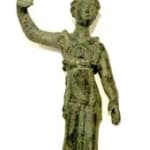Roman Bronze Sculpture of Minerva, 1st Century CE - 3rd Century CE
Bronze
5.25
X.0642
The name 'Minerva' is likely imported from the Etruscans who called her Menrva. The Romans would have easily confused her foreign name with their word means meaning 'mind' since one...
The name "Minerva" is likely imported from the Etruscans who called her Menrva. The Romans would have easily confused her foreign name with their word means meaning "mind" since one of her aspects as goddess pertained not only to war but also to the intellectual. Minerva was the daughter of Jupiter and Metis. She was considered to be the virgin goddess of warriors, poetry, medicine, wisdom, commerce, crafts, and the inventor of music. As Minerva Medica, she was the goddess of medicine and doctors. Adapting Greek myths about Athena, Romans said that Minerva was not born in the usual way, but rather Jupiter had a horrible headache and Vulcan opened up his head and out came Minerva dressed in armor and holding a shield; this image has captivated Western writers and artists through the ages. Ovid called her the "goddess of a thousand works." Minerva was worshipped throughout Italy, though only in Rome did she take on a warlike character. Minerva is usually depicted wearing a coat of mail and a helmet, and carrying a spear. The Romans celebrated her festival from March 19 to 23 during the day which is called, in the feminine plural, Quinquatria, the fifth after the Ides of March, the nineteenth, the artisans' holiday. A lesser version, the Minusculae Quinquatria, was held on the Ides of June, June 13, by the flute-players, who were particularly useful to religion. Minerva was worshipped on the Capitoline Hill as one of the Capitoline Triad along with Jupiter and Juno. In present-day Rome, you can visit Piazza della Minerva near the Pantheon. In 207 BC, a guild of poets and actors was formed to meet and make votive offerings at the temple of Minerva on the Aventine hill. Among others, its members included Livius Andronicus. The Aventine sanctuary of Minerva continued to be an important center of the arts for much of the middle Roman Republic. In Plutarch's Lives: Pericles; Minerva appears to Pericles in a dream and orders a course of treatment for an injured citizen of Athens. The treatment cured the man and a brass statue was erected in honor of Minerva. Minerva was born from the head of Jupiter.



